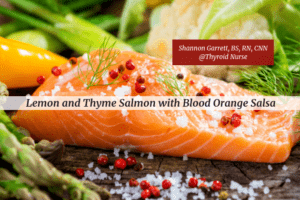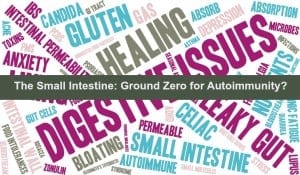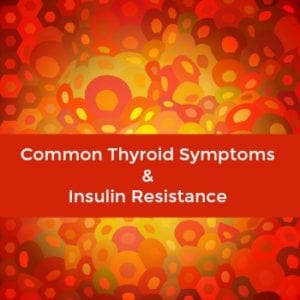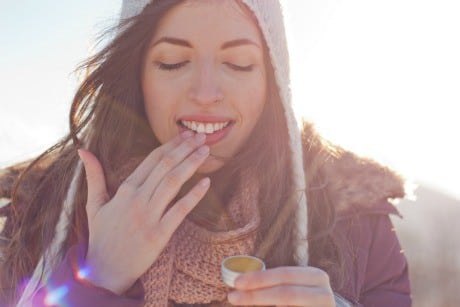
As part of the largest organ of our body, the skin on our lips is also one of the most sensitive. This skin is formed the same way as the rest of our body’s skin, except that its outer, multilevel cell layer is very thin and not as well protected by a tough outer layer or the secretion of oils.
Also, lip skin has fewer cells, the melanocytes, that produce the dark pigment called melanin. Less pigment means that the lips have only partial protection from UV rays and dry, hot air that can cause skin to tear.
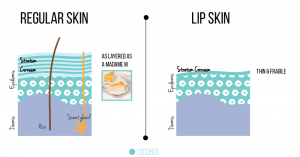
It’s no wonder, then, that many of us suffer from dry, chapped or cracked lips, often accompanied by unsightly and bothersome fissures. Besides the effects of environmental factors, cracked lips can also reveal a vitamin deficiency, such as too little vitamin B2. I use and recommend a high quality vitamin B complex for women especially if you have Hashimoto’s, adrenal fatigue, hormone imbalance and/or the MTHFR gene SNP. Salt, pepper or other spices that create a burning sensation on your lips can irritate them further. Even stretching your mouth too often can crack your lips.
Soothe and protect cracked lips with herbal salves and other natural remedies; also make sure you are receiving optimal nutrition through nutrient-dense foods, healthy fats like coconut oil, avocado, sprouted nuts & seeds and lean sources of protein such as wild-caught salmon and pastured organic chicken.
An iron deficiency can encourage the formation of cracks or fissures on the skin or lips. To prevent this, eat foods that contain iron, such as vegetables, legumes, and moderate amounts of animal protein. More iron is needed during pregnancy, for anemia caused by loss of blood from an injury, during heavy menstrual periods or during a growth spurt. At these times, it is appropriate to take commercial iron supplements, as well.
Vitamins Help
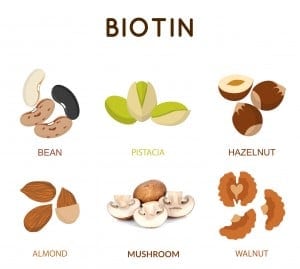
Vitamins, especially B-complex vitamins and beta carotene and the mineral zinc are essential for your skin. They are considered very important to both cell metabolism and tissue structure; this is because they guarantee the skin’s ability to regenerate and protect itself from infection. The vitamin biotin also plays a significant role in cell growth and the utilization of other B-complex vitamins. Biotin is found in nuts, almonds, legumes, mushrooms, and nutritional yeast.
It’s important to eat a balanced, vitamin-rich diet and drink plenty of water. You should use a lip balm, such as calendula ointment, with UV protection, especially at high elevations or near water; be sure to apply it regularly. In winter keep the indoor temperature at about 68°F with 50 percent humidity.
Honey for Skin Inflammation
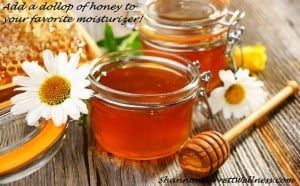 Bacteria can enter the body more easily through sores on the skin of your lips. One way to prevent an infection is to smooth honey over your lips. Bee enzymes are present in the honey, giving it an antibacterial effect and helping to soothe your lips.
Bacteria can enter the body more easily through sores on the skin of your lips. One way to prevent an infection is to smooth honey over your lips. Bee enzymes are present in the honey, giving it an antibacterial effect and helping to soothe your lips.
Prevent Iron Deficiency
An iron deficiency can encourage the formation of cracks or fissures on the skin or lips. To prevent this, eat foods that contain iron, such as vegetables, legumes, and moderate amounts of animal protein. More iron is needed during pregnancy, for anemia caused by loss of blood from an injury, during heavy menstrual periods or during a growth spurt. At these times, it is appropriate to take commercial iron supplements, as well.
For Overall Health and Smoother Skin
Chronic sores in the mouth or cracks on the lips can indicate dryness or inflammation in the bowels! Try drinking more water and eating more fiber, fresh fruits and vegetables. Avoid common food allergens such as white flour, dairy, gluten and eggs. You also want to avoid sugar, refined carbs and caffeine. If nightshades or legumes present a problem for you, please avoid them.
For the Best Lip Sunscreen
Greasy or waxy lip sunscreens are generally not effective over long periods of time. A liquid gel will give longer-lasting protection. Avoid petroleum jelly; it gives no UV protection at all.
Natural-Healing Techniques
[two_column_block style=”1″] [content1]
- Calendula ointment
Calendula, one type of marigold, has properties which heal wounds and are antiseptic. Ointments made from the plant’s fresh-orange and yellow flowers are available in health-food stores and may be applied frequently. - Witch-hazel compress
Witch-hazel is often recommended to help heal minor skin injuries. To make a tea, pour 1 cup of hot water over 1 tablespoon of witch-hazel leaves and let it steep for 20 minutes. Apply this tea as a compress to the lips several times a day. The active ingredients have anti-inflammatory, constrictive effects and will control bleeding. You can also prepare the tea with witch-hazel extract or diluted witch-hazel extract.
[/content1] [content2]
Essential oils that have been mixed with a carrier oil are a good way to help heal chapped lips, boost cell regeneration and effectively protect the skin. Mix one of the following essential oils with 4 ounces of sweet almond oil. Shake the mixture well and let it sit in a cool place for 2 weeks. Apply before going to bed.
- 3 drops patchouli or bitter-orange oil to stimulate new cell growth
- 3 drops of chamomile or sandalwood oil to inhibit infections and relieve skin inflammation
- 3 drops of vetiver oil to help regenerate tissues under the skin
[/content2] [/two_column_block]
Proven Home Remedies
Olive oil, coconut oil and cocoa butter are also well suited for general lip care. Use them as often as needed to moisten painful dry spots. The fat content in the olive oil is soothing, and the cocoa butter contains vitamin B2 (riboflavin), which also helps to protect the skin. Unrefined, virgin coconut oil is rich in lauric acid which has been found to have antioxidant, anti-inflammatory, antibacterial and anti-fungal properties.
Cracked Lips & Vitamin Deficiency Extra Tip
If you frequently lick your lips, try to break the habit, The practice only dries out the sensitive skin because it removes the natural oily film on your lips.

